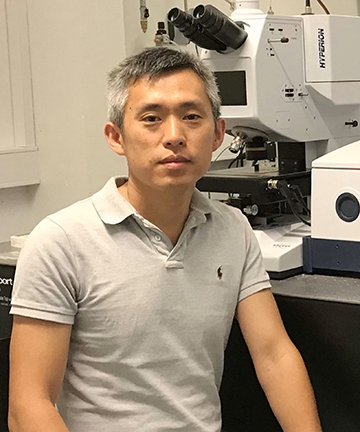
Sanshui Xaio
For this installment of Senior Member Insights, we talk with Sanshui Xiao. Sanshui is an associate professor at DTU Fotonik, the Department of Photonics Engineering at the Technical University of Denmark, in the group for structured electromagnetic materials. Sanshui is also a topical editor for Applied Optics. His current research interests center on nanophotonics, plasmonics and 2-D materials, particularly focusing on the study of light-matter interactions at the nanoscale and the exploration of advanced optical nanostructures and 2-D materials for optoelectronic applications.
What first interested you in pursuing science?
When I was a student in high school, I loved physics and mathematics, so I choose to study physics at university. When I was an undergraduate student, I was inspired by a lecture discussing the new concept of the photonic crystal and its potential applications for optical communications. That led to my Master’s and Ph.D. study focus.
What is one piece of advice that you wish you were given as a student/early in your career?
Choose what you love or like to work on and show your enthusiasm for your job. As a person working in academia, it is important to keep your curiosity, patience and ambitions.
What professional resources do you rely on to stay active and engaged with your field?
Similar to most people, I actively participate international conferences every year, give talks/seminars either at conferences or universities, and publish results to share what we have done.
For those who know and understand Chinese, there is a very unique platform, Wechat, on which we can easily share information and network. For example, I have a special Wechat group with almost 400 young professors who are working in photonics from all around the world. We share job information, introduce new results and even make friends. This kind of platform really allows me to easily connect with people in the same research field.
What tips for effective collaboration and successful networking do you have for early-career professionals?
Show your openness and engagement when collaborating with others. Respect the time and the work that others have done. Having a schedule will make collaboration run more smoothly.
I would suggest that early-career professionals present at and attend international conferences every year. Giving a poster presentation allows for face-to-face discussions with experienced people. Organizing a conference or conference session would also be beneficial, as it is an opportunity to establish contact with experienced professionals.
What have you learned by being a mentor to others?
Everyone is different, including his/her language, working style, and culture. I have learned how to be patient with students and motivate them to make a good project. I have also learned that students are the main drivers/managers of their projects, and the supervisors are the people who help them to achieve the goal of their projects.
How do you define success in your career?
My definition of the success in my career is that I can educate more students and to bring them into academia.
How important are leadership roles in career development and how do you hone your leadership skills?
Leadership includes the skills of communication, motivation, positivity, creativity and so on. No matter if you are in industry or academia, it plays a big role for your career development. Currently, I have coordinated a number of network grants that allow people from many countries to work together.
What advice do you have for young scientists who are about to interview for their first job?
You should present your skills and knowledge, with a combination of good examples, and show your enthusiasm for the job that you are interviewing for. Team work is also one of the important elements that an employer is looking for.
At this point in your career, what are you most looking forward to next?
There are always many interesting scientific projects that we can work on. What I am really looking for is to work on a project that can solve problems existing in our society, for example, health or energy problems. But most of projects that I am currently working on are still far from solving these issues.
If you weren’t in the sciences, what would be your dream career?
I am a father of three kids, and often feel some challenges to figure out what they are thinking and why they behave like that. I would love to be a psychologist dedicated to small children, which would help me explore their happy and simple world.
